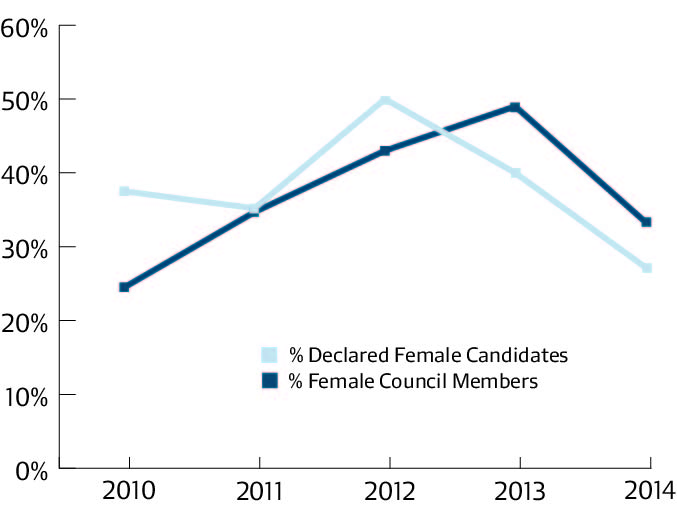
News
Cambridge Residents Slam Council Proposal to Delay Bike Lane Construction

News
‘Gender-Affirming Slay Fest’: Harvard College QSA Hosts Annual Queer Prom

News
‘Not Being Nerds’: Harvard Students Dance to Tinashe at Yardfest

News
Wrongful Death Trial Against CAMHS Employee Over 2015 Student Suicide To Begin Tuesday

News
Cornel West, Harvard Affiliates Call for University to Divest from ‘Israeli Apartheid’ at Rally
UC Records Indicate Greatest Gender Imbalance in Four Years
Only about one out of every four candidates who ran in this year’s Undergraduate Council election was female—the greatest gender disparity in candidate declarations in five years. And of those elected, only slightly more than one out of three is a woman, according to a Crimson analysis confirmed by the UC Elections Commission.
With those results, the College’s student government is now two-thirds male and the least gender balanced it has been in four years, leading many top Council leaders to question what changed from the previous year, when the Council was nearly evenly split by gender.
The increased male proportion comes after an election cycle in which Council leaders contend they used new platforms, including a video from University President Drew G. Faust, to encourage undergraduates to run for student government. At the same time, though, the Council has left vacant an appointed committee position meant to encourage gender parity and neglected to follow many recommendations from a 2013 internal report on the issue.
Despite the growing disparity, the UC’s top leaders maintained that they are committed to gender diversity, especially given the prominence of current discussions of sexual assault among undergraduates. Both UC President Gus A. Mayopoulos ’15 and Vice President Sietse K. Goffard ’15 acknowledged the lopsidedness in this year’s elections and the importance of increasing female representation.
“We definitely noticed that there was a lack of balance compared to last year,” Goffard said. “It was definitely an issue of concern.”
Aisha Bhoori ’18, who unsuccessfully ran a campaign in Ivy Yard last week, expressed a similar sentiment of concern on Monday.
“The people who were watching this campaign…were definitely cognizant of the lack of female representation,” Bhoori said. While she made clear that she believes candidates should be elected based on merit, Bhoori said the paucity of female candidates in this year’s elections was “definitely disconcerting for me as a female.”
The UC has long been “a male-skewed leadership organization,” according to an October 2013 internal report on gender parity. Beginning in 2010, however, the Council passed a bylaw introducing the role of a gender parity representative to its Student Relations Committee and stepped up efforts to encourage students of varying genders to join the body. By 2013, under the leadership of former UC President Tara Raghuveer ’14 and Vice President Jen Q. Zhu ’14, the Council hit an almost even gender split among candidates who declared and won positions on the Council.
Slowly, though, many of the recommendations laid out in the report have ceased to be implemented. Last year’s Student Relations Committee did not officially appoint a gender parity representative; the committee’s chair, Ava Nasrollahzadeh ’16, described the position as “pending.”
The 2013 gender parity report also suggested that the UC continue organizing a “Meet the Candidate” night, as required by 2010 legislation passed by the Council. But the event has not been hosted in a couple years, according to Goffard. Additionally, the report recommended introducing a dialogue for first-year students about “gender stereotypes and campus challenges with respect to achieving gender parity.” Goffard said the UC has been in contact with the Office of the Student Life about this initiative, but it has yet to implemented.
He added that part of the broader problem with reports published by the UC is the body’s inability to implement all of the recommendations.
Still, as they have let some measures wane, UC leaders say they have augmented others, including sending emails to student organizations focused on sexuality, race, or gender and holding a campaigning workshop in the Harvard College Women’s Center, according to Mayopoulos.
Given the totality of the body’s efforts, current and former leaders conveyed a difficulty in pinpointing the exact source of this year’s imbalance, beyond pointing to the fact that the current UC president, vice president, secretary, and treasurer are all male.
“Having a male president and male vice president is much different than having a female ticket such as Tara and Jen,” Nasrollahzadeh said. Mayopoulos suggested that seeing two males as the face of the UC this year may have led a disproportionate number of men to run for a position on the Council.
But that cannot be the whole explanation, Raghuveer said, arguing that looking only to the gender of the Council’s top leaders is “a little bit of a simplistic explanation.” Raghuveer said she could not speculate at an alternative explanation. Zhu, for her part, wrote in an email from Uganda on Monday that she is “disappointed by the reversal of gender parity back to more unequal levels.”
Others on the Council said they are less concerned with the gender imbalance of this year’s representatives.
Nasrollahzadeh says that the Council’s Executive Committee—which is now evenly split along gender lines after two spots previously filled by males have become vacant—is a “stronger indication of where gender stands on the Council than elections are.”
And Yasmin Z. Sachee ’18, who won an election in Ivy Yard where the other nine candidates were male, said that she did not take gender into account when campaigning and does not personally feel the effect of the Council’s disparity.
—Staff writer Noah J. Delwiche can be reached at noah.delwiche@thecrimson.com. Follow him on Twitter @ndelwiche.
Want to keep up with breaking news? Subscribe to our email newsletter.

